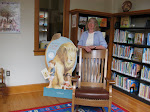The locust bloomed last Tuesday. I swear there wasn’t a blossom in sight on Monday, but when I drove home Tuesday evening, the valley was covered with white sweet pea-like blossoms. And the scent! When the black locusts bloom, I think this must be heaven. It’s enough to make me believe in aromatherapy. Just like the way the sun slants through the library’s windows made me finally decide there might be something to feng shui.
Our senses have such a strong impact on our moods. Scents that trigger memories of places we’ve been, the way light plays across a room triggering feelings of happiness or sadness, the spiritual experience of a great meal. We forget sometimes, wrapped in words and thoughts, about the fact that we experience life not just with our head, but our body; not just by what we see, but what we taste, smell, hear, and feel. The best writing transports us to another world for that very reason. It stimulates our senses, inducing a cascade of emotions.
For me reading is like a reality show that starts with the disclaimer “don’t try this at home.” When I read good writing, it seems so simple, so easy. I think, “I could do that.” I mean after all their just words strung together to tell a story. But then I try it, I realize I’m at the “See Dick run” stage. The beautiful descriptions of Dick’s long colt like legs stirring up the dust as they lope across the school yard, just don’t come that easy for me. I can’t think of what to compare Dick’s freckles to, other than – well – freckles.
Those beautiful twisty, curvy metaphors take work. Like Wallace Stegner’s “Floating upward through a confusion of dreams and memory, curving like a trout through the rings of previous risings, I surface. My eyes open. I am awake,” from Crossing to Safety. And I can feel the night coldness when I read Sharon Shinn’s line from Mystic and Rider, “She liked the deep stillness of an untenanted night, the pervasive cold that seemed to take corporeal from and lean against her like an affectionate child.” I want to write that line!
And it’s the details that count – not that Dick ran, but how he ran. In the opening paragraph of Brad Kessler’s Birds in Fall he doesn’t say they plane was in trouble, he writes “We were eighty minutes into the flight. Orion on our left, the bear to the right,” and I’m there looking out the plane window. Or in Three Bags Full by Leonie Swann, she describes a flock of sheep discovering their dead shepherd, “The shepherd was lying in the green Irish grass beside the hay barn, not far from the path through the fields. He didn’t move. A single crow had settled on his woolly Norwegian sweater and was studying his internal arrangements with professional interest,” and it isn’t any dead shepherd or scavenger, but a very particular shepherd and professional crow.
And there are those incredible first lines that keep you reading. “The best day of my life happened when I was five and almost died at Disney World,” Libba Bray starts Going Bovine (what a title by the way!) And continues, “I’m sixteen now, so you can imagine that’s left me with quite a few days of major suckage.” Or John Green’s “The morning after noted child prodigy Colin Singleton graduated from high school and got dumped for the nineteenth time by a girl named Katherine, he took a bath” from The Abundance of Katherines and he’s hooked me. I need to know about a guy who’s dated and been dumped by nineteen Katherines.
Yes, I keep trying to do these tricks of writing at home, and I keep reading these lines, hoping I’ll someday write one as good. It’s just a lot harder than it looks.
Wednesday, June 8, 2011
Subscribe to:
Posts (Atom)

